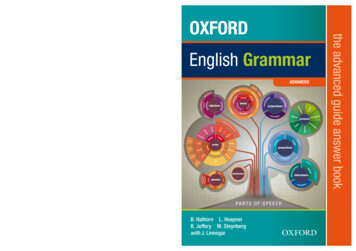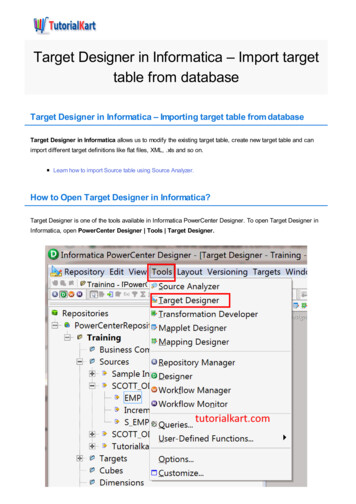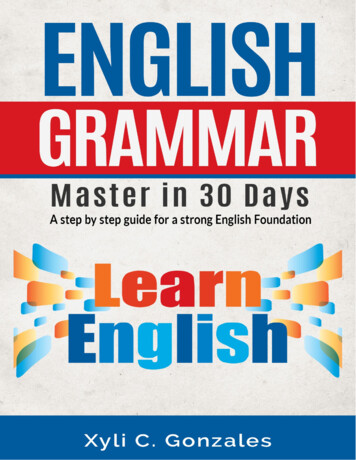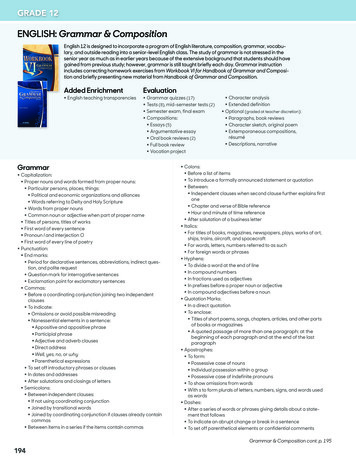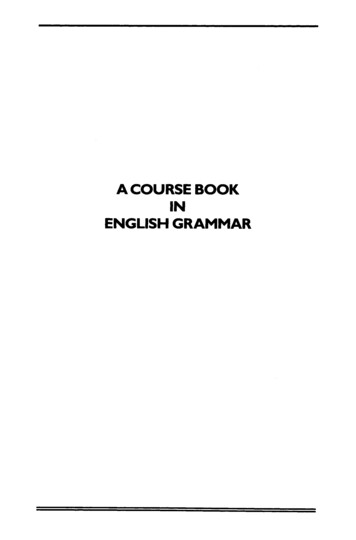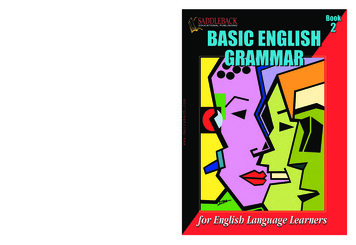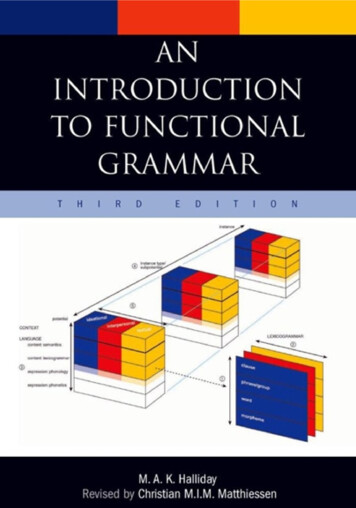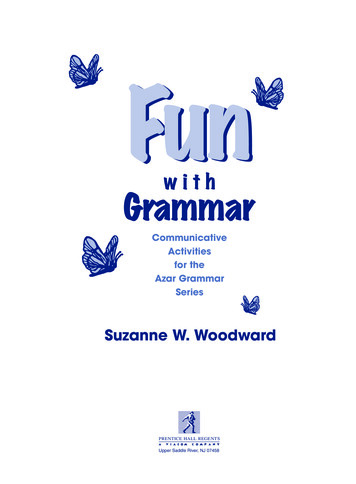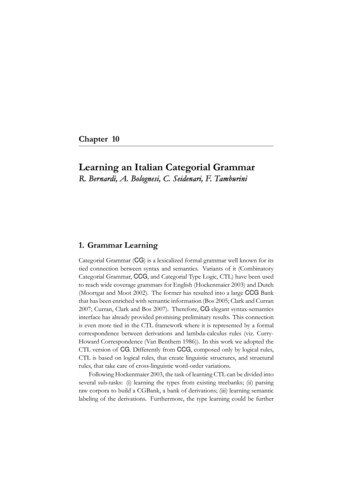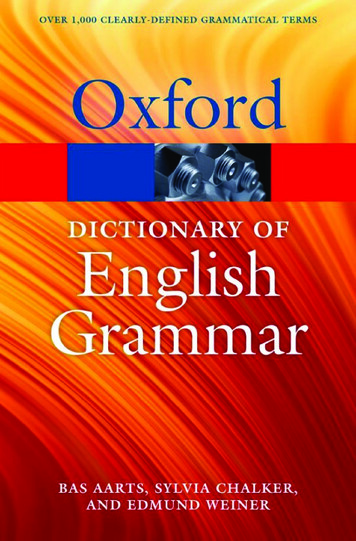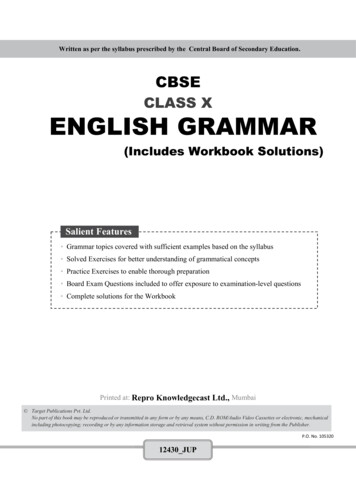
Transcription
Written as per the syllabus prescribed by the Central Board of Secondary Education.CBSECLASS XENGLISH GRAMMAR(Includes Workbook Solutions)Salient Features Grammar topics covered with sufficient examples based on the syllabus Solved Exercises for better understanding of grammatical concepts Practice Exercises to enable thorough preparation Board Exam Questions included to offer exposure to examination-level questions Complete solutions for the WorkbookPrinted at: Repro Knowledgecast Ltd., Mumbai Target Publications Pvt. Ltd.No part of this book may be reproduced or transmitted in any form or by any means, C.D. ROM/Audio Video Cassettes or electronic, mechanicalincluding photocopying; recording or by any information storage and retrieval system without permission in writing from the Publisher.P.O. No. 10532012430 JUP
PREFACEIn the case of good books, the point is not how many of them you can get through, but rather how many can get through to you.“Std. X : English Grammar” is a complete and thorough guide, critically analysed and extensively drafted toboost the student’s confidence. The book is prepared as per the syllabus prescribed by the National Council ofEducational Research and Training (NCERT).The book contains detailed theory along with sufficient examples for each topic. Solved Exercises have beenprovided to facilitate better understanding of the concepts. Ample Practice Exercises have been included to give aninsight on the difficulty level of various questions. Additionally, the Board Questions covered for each topic will enablethorough preparation of the student and provide exposure to examination level questions. The book also includesSolutions for all the questions in the Workbook.The journey to create a complete book is strewn with triumphs, failures and near misses. If you think we’ve nearlymissed something or want to applaud us for our triumphs, we’d love to hear from you.Please write to us at: mail@targetpublications.orgA book affects eternity; one can never tell where its influence stops.Best of luck to all the aspirants!Yours faithfully,PublisherEdition: SecondDisclaimerThis book is intended to be study material expressing views and elaborating concepts for ease of understanding for students and purely for their benefits. We make norepresentations as to accuracy, completeness, correctness, suitability, or validity of any information through this study material. And, shall not be held liable or responsiblefor any errors, omissions, or differences in this information or any losses, injuries or damages arising from its use. All information is provided on as it is basis dependingupon the understanding of the author and his/her elaboration of such concepts along with adoption and inspiration from various other texts in relation to the topics asmentioned in this study material. It is the reader’s responsibility to verify their own facts. Through this study material we are only explaining and elaborating variousconcepts as may be necessary for the students in the present framework and context.The views and opinions expressed in this study material are purely as per the understanding of the authors and do not necessarily reflect the official policy or position of anyother agency, organization, employer or company. Assumptions made in this analysis are not reflective of the position of any other than the authors - and since we arecritically thinking human beings with personified opinions, these views are always subject to change, revision and rethinking at any time. Please do not hold us to them inperpetuity.Readers shall not misconceive this work with any other work. This work is purely inspired upon the course work as suggested and prescribed by the National Council ofEducational Research and Training (NCERT).All the facts and figures so stated have been purely adopted from various research points purely for the purpose of representation and explaining the students and readers atlarge as a part of fair dealing. By producing anything and everything in this book the author does not intend to claim copyrights on any such material but has been purelyadopted and used for the purpose of representation and for better understanding of the students with a pure intention to educate the public at large for a better India.
01. PrepositionsBasic Grammar 01: Prepositionse.g.IntroductionPrepositions are words which show therelationship between two words in a sentence. Theyare very important in English grammar. The rules ofpreposition and its uses play a prime role in writtenEnglish.Prepositions are used to connect nouns,pronouns and phrasess in any sentence. Therelationship can include direction, place (or aparticular point or location), time, manner, cause andamount (or degree).The preposition is almost always before the noun orpronoun and hence it is called a preposition.Some examples of prepositions are illustratedbelow:i.The ball is below your bed.below is a preposition which shows place.ii.He came by bus.by is a preposition which shows manner. iii.e.g. iv.e.g. v.Forms of PrepositionsThere are five forms of prepositions:i.Simple Prepositions: Simple prepositions areused in simple sentences.e.g. In, on, at, to, from, with, by etc. I am not coming with you.e.g.ii. Compound Prepositions: When we join twoconnecting nouns, pronouns and phrases thenwe use compound prepositions.About, across, among, between, beside,before etc.I will reach there before she leaves.Double Prepositions: A double prepositionis two (prepositional) words used in asentence to connect nouns, pronouns andphrases with other words in a sentence.Outside of, out of, from behind, because ofetc.It was just because of you that they went toschool.Participle Prepositions: When a participle(an -ed or –ing verb) is used as a prepositionit is known as a participle preposition.Concerning, pending, considering assuming,barring, during, given, notwithstanding,provided, regarding.I think I can do it easily considering myknowledge.Phrase Prepositions: A prepositionalphrase is a group of words containing apreposition, a noun or pronoun (object of thepreposition), and any modifiers of theobject.According to, in spite of, on account of, infront of, in order to, for the sake of, bymeans of, with reference to, in addition to,due to etc.According to me, there are three members ofthis company.Types of PrepositionsPrepositions are mainly of five types: Place, Time, Direction, Movement and Position.i.Preposition of Place: There are three prepositions of Places.AT - used for a point of placeIN - used for spacesON - used for surface tops At the end of the pageAt the cornerAt homeAt the sideIn MaharashtraIn the mallIn the buildingIn the skyOn the tableOn the computerOn the busOn the right/left At the exit/entranceAt workAt school In the hallIn my pocketIn the newspaper On the motorcarOn the pageOn the radioOn the wayNote: There are some exceptions which do not follow these rules.1
Class X: English Grammarii.Preposition of Time: There are two prepositions of Time.AT - used to indicate a precise timeNote: At night is an exception to thisrule.IN - used for indicating a time periodNote: In the morning/afternoon/evening are the exceptions to this rule.iii.Towards - used to show the direction ofthe destination.From - used to show the point of origin(i.e. starting or departure point)Off - used to indicate either ‘being takenaway from’ or ‘down from’For - used to indicate direction onlywhen the verb indicates the beginning ofa movementAgainst - used to indicate contact orpressureOut of - used to indicate departure fromAt 4:30 a.m.At sunrise/noon In JanuaryIn the 90’s In 2015In this century The ball went under the door.The file is underneath the packages.The airplane went over the clouds.I saw him standing below the building.We sat beneath the apple tree.They stay above the shop. A place - I am going to the shop.An event - Are you going to the dance party?A person - I am going to your principal to complainabout you.A position - The kitchen is to your left.Abdul was running towards the bus stop.Please turn towards your left to exit.She has started from home.They have left from Mumbai already.We are from Chennai.The salesman took the bottle off the shelf.The cat fell off the tin roof.They will leave for home tomorrow.My son has already left for Singapore. Sona leaned against the wall.Father, put the box against the wall.Alok went out of the classroom.We need to get out of this place.Preposition of Movement: There are six prepositions of Movement.Through/Across - used to show themovement from one point to the otherInto - used to show the movement ofgoing insideOnto - used to show the movement onan object.Along - used to show the movement thatis adjacent in line.In/On/By - used to indicate a means ofUp/Down - used to show the movementacross an upper or lower level22 Preposition of Direction: There are seven prepositions of Direction.To - used to indicate a specificdestinationv.At ten o’clockAt the moment/this timePreposition of Position: There are two prepositions of Position.Under/Underneath and Over - usedto indicate position that is verticallydown or vertically upBelow/Beneath and Above - used toindicate position that is lower or higheriv. The hunters went through the forest.We went across the road.We got into the cinema hall. The coin rolled onto the pavement. We were walking along the river. They travelled in a ship for the first time.He was the only one who was travelling on foot.We came by bus.Romy and Suzy climbed up the mountain as a challenge.They came down from Vaishno devi temple as fast asthey could.
Basic Grammar 01: PrepositionsPreposition RulesThere are two main rules to follow to useprepositions.i.Preposition’s Choice: Certain prepositionsmust follow certain words and make therelationships between words in the sentencesclear.e.g. a.Able tob.Capable ofc.Preoccupied withd.Prohibited fromThese prepositions must follow these words. Itwould be grammatically incorrect to say “ablewith” or “capable to”ii.e.g.Preposition’s Position: Prepositions arefollowed by a noun and have an object, andhence they are not used at the end of asentence.However, in certain cases the meaning of asentence can change without the preposition atthe end of the sentence.“I turned the TV on.”If you removed the “on” from the end of thissentence, it would change the meaning.Instead of switching on the set, one would besaying that one turned the TV itself.Key To Learningi.ii.iii.A preposition is followed by a noun, whichincludes:a.dog, money, loveb.Bangkok, Maryc.you, him, usd.my first jobe.swimmingA preposition is never followed by a verb.It is permissible to end a sentence with apreposition.iv.It is permissible to begin a sentence with apreposition or a prepositional phrase, but inrare cases only.v.If the preposition is required to be followed bya verb, then the “-ing” form is used, which is agerund or verb in noun form.vi.A prepositional phrase always begins with apreposition and ends with a noun or pronouncalled the object of the preposition.The most commonly used prepositions are ng despitedue pt‘f’forfrom‘i’inofowing tooffon behalfofonoverontooutoutside‘p’in front ofpast‘r’intoinsidein favour ofin spite ofinstead thuntilupuponup to‘w’withwithinwithoutwithregards toSolved Exercises1.Fill in the blanks with the correctpreposition.i.They went the zoo last week with theirteacher.ii.Isaac arrived work early this morning.iii.Everybody was talking him after therumours spread.iv.They need to drive the tunnel beforethey reach the destination.v.You better put a jacket your shirtbecause it is really cold today.Ans: i.toii.foriii. aboutiv.throughv.over2.Read the paragraph given below and fill inthe blanks by choosing the correct optionsfrom those that follow:[CBSE 2014]A recent research gives smokers one morereason to quit smoking. (i) additionto affecting the lungs, (ii) alsodamages the eyes. The more cigarettes peoplesmoke and the (iii) they do so, thegreater the risk of damaging their td.thatiii.a.frequentb.fasterc.oftenerd.quickAns: i.a. Inii.c. itiii. b. faster3
Class X: English Grammar3.Insert the appropriate preposition in thefollowing sentences:i.Slaves sleep the stables.ii.Jacob was feeling lonely Bella by hisside.iii. Suddenly, as we were near the bus stop, thesuspicious car started moving us.iv.Use the ladder that is leaning thewall.v.We have got a house a big garden.Ans: i.inii.withoutiii. towardsiv.againstv.with4.Fill in the blanks with the correctpreposition.i.The treasure is buried (on, under,in) the two coconut trees.ii.The secret documents were hidden(inside, at, in) a filing cabinet.iii. I like to listen (on, at, to) the radiowhen I wake up.iv.She left without paying (for, at, in)the meal.v.A lot of people borrow money (on,from, in) the bank.Ans: i.underii.insideiii. toiv.forv.from5.The following passage has not been edited.There is one error in each line. Identify theerror and write it along the correction inthe answer sheet. The first one has beendone for you as an example.One morning I finished one business at thebank and was returning in pick my motorbikewhich I had left in the parking lot outside.Suddenly he realised that I had lost the bikekeys. Upset I searched about it in the bank. Abank employee tried to help me find it, and invain.Errori.ii.OneCorrectionsome[CBSE ctionsometoIforbut6.i.ii.iii.iv.v.The following passage has one omission ineach line. Identify the word and write italong with the words that come before andafter the ommission in the answer sheet.Ensure that the word that forms youranswer is underlined.Self-help is very important. You need to be selfreliant and not depend others or wait for others tocome to your rescue. danger, if we use ourpresence of mind we can surely reach safety.Sometimes we have to face some difficultsituations accidents, fires, etc. but, we onlyneed to takeinitiative to find ways to our safety. In short,though help is, our safety is ourresponsibility and we should watch out forourselves waiting for tionsisourselvesOmissionuponIn times ofduringat hand,instead i.iii.iv.v.Practice ExercisesGap Filling Exercises1.Choose the correct preposition in thefollowing sentences.i.The classes will be held (on/at/in)Sundays.ii.The speaker will be coming(by/from/in) car.iii.The name of the author is provided(at/by/in) the end of the chapter.iv.You will find out who the murderer is(at/by/in) the end of the chapter.v.Put it the right. (in/on/at)Ans: i.onii.byiii. ativ.byv.on2.i.ii.iii.iv.Fill the blanks with the correctprepositions.He is interested (on/at/in) learningkarate.I will pick you up (on/at/in) 8 a.m. onMonday.I am going to lose at least 5 kgs (on/at/in) one month.I have a doctor’s appointment(in/on/at) Saturday.
Basic Grammar 01: Prepositionsv.Could you get me this shirt (on/at/in) a smaller size?Ans: i.inii.atiii. iniv.onv.in3.Fill the blanks with the correctprepositions.i.I am going the market.ii.Do you want to go a swim?iii.Chandigarh is seventeen hours fromhere.iv.The plane will take off fifteenminutes.v.The trapped mouse escaped the holein the wall.Ans: i.toii.foriii. about/ almostiv.inv.through4.Fill the blanks with the correctprepositions.i.Can I borrow your umbrella a day?ii.I went to sleep 11:00 p.m. last night.iii.The Gupta’s haven’t been to their hometownlast year.iv.I have lived in Mumbai many years.v.Don’t worry; she will be there anhour.Ans: i.forii.atiii. sinceiv.forv.in5.Insert the appropriate preposition in thefollowing sentences.i.The teacher walked the classroom.ii.My brother stopped a local dhaba tohave his dinner last night.iii.The meeting starts 10:30 in themorning.iv.The dog jumped the fence.v.Go and sit .Ans: i.intoii.atiii. ativ.overv.down6.Complete the paragraph given below byfilling in each of the blanks with the helpof the options that follow.The Government has announced a uniqueway of curbing dengue fever. Action will betaken against owners (i) watercoolers which (ii) found to bebreeding grounds for the Aedes mosquito.“(iii) people take action on thiswarning,” a government spokesperson said,“dengue fever will grow into an .arehaveiii.a.c.UnlessButb.d.c.a.ii.IfTill[CBSE 2013]b. areAns: i.iii.withUnless7.Fill in the blank with the correctprepositions.T.V. has brought people closer than everbefore, (i) modern satellite technologythat connects even the remotest regions (ii)the world to us in seconds. While wehear that many (iii) our young peoplespend more time (iv) their T.V. sets,than in their classrooms or with their textbooks,it is, in fact, very true that television hasbecome the single most powerful influence, asan electronic medium, (v) the lives ofmany youngsters today.Ans: i.due toii.ofiii. ofiv.before/in front ofv.in8.Complete the following sentences with thecorrect prepositions.Radhika has always been a top scorer (i)her college. (at/in)But (ii) everyone’s surprise, she (in,to) dropped down (iii) the tenthposition (to/on) (iv) the overall datacreated (as, in) (v) the college dean.(for, by) (vi) to what may havecaused this degradation(As/In) (vii)her long held position is still unknown. (of/by)The principal (viii) the college wasthen told about her grandfather’s demise.(for/of) Everyone felt sorry (ix) herloss (by/for) and expressed condolences (x)view of this tragedy. (by/in)She was offered extra classes (xi)(for/by) her subject teachers to cope (xii)the syllabus. (for, with)[CBSE 2012]Ans: i.inii.toiii. toiv.inv.byvi.Asvii. ofviii. ofix.forx.inxi.byxii. with5
“Std. X : English Grammar” is a complete and thorough guide, critically analysed and extensively drafted to boost the student’s confidence. The book is prepared as per the syllabus prescribed by the National Council of Educational Research and Training (NCERT). The book contains detai
